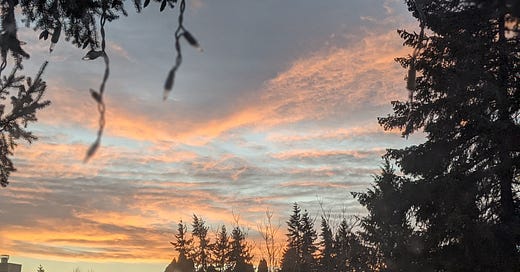Grammar
The world's replete with prepositions. Speech
parsed just so bids me gaze beyond my reach
beneath, within, away and through
illimited by my feet and the earthbound view--
words, phrases, paragraphs written on the blue.
Rabbi's voice reminds that parables abound
above, and here where I walk, the ground
reveals to my attentive gaze the Kingdom
awaits in mossy cracks and rain-dript ways
penned with earthly sights and sounds.
Roguish clouds play at the edge of sky
write of a kingdom beyond my sight
luring my vision over sodden ground, high
atop feathered evergreens where God is found.
from my book “Hearts on Pilgrimage: Poems & Prayers”
The word ‘poem’ comes from ‘poiema’, a Greek word meaning ‘a created or made thing.’ The word is used in Paul’s epistle to the Galatians when he declares we are God’s ‘handiwork’ or ‘workmanship’. That idea gives me pause, to consider that God is writing a poem with my life, always creating something new.
Whenever we plant a garden, prepare a meal, paint a room, write a song, partner with God in any expression of creativity, we become makers, too. Even organizing chaos is a creative act; and some days the most creative thing I can do is organize my purse.
When I began to venture into writing poetry in earnest, my tutelage started as I read, listened and studied other Christian poets I admired. Okay, I basically fangirled a bunch of poets at conferences and workshops and readings. And many of them became friends.
An essay that formed my own writing journey was penned by Seattle-area poet Scott Cairns in the volume, A Syllable of Water. 1 In Cairns’ essay I discovered that poetry is not the opposite of prose; they aren’t two different genres, they are two different forms. The text in prose is formed by sentences which run to the edge of the page and then wrap around.
Poetry, on the other hand, is written in verse, from the Latin word ‘versa’ meaning to turn. Because of this, in free verse, poets pay attention to end words, focusing on language that encourages the reader to move along and turn to the next line to discover more.
When I’m writing a poem I’m forced to be succinct in what I want to say, which is hard because I have thoughts. And I like to share them. But being limited by the form also forces me to be more creative, to choose a “just right” word to let the meaning shine through. And because I love language and words like ‘mellifluous’ and ‘verdant’ and ‘chrysoprase’ (all which have appeared in my poems) the form of poetry allows me to reach into the thesaurus of my mind (or pick up my dictionary, always a fun endeavor).
The form of the poem ‘Grammar’ above is sonnet-like; fourteen lines of 10 beats each with an endword rhyme scheme. But count closely and you’ll see some lines have 9 beats, some 11. Nevertheless, I was pleased with the it turned out; it sort of wrote itself, a very rare occurrence. (Most of my other work needs lots of revising!)
As I sit here now, tapping at computer keys with an eye on the sky, the always-moving clouds remind me again of God’s language, laced with prepositions like those in my ‘Grammar’ sonnet. Evergreens outside my window arrow towards the leaden heavens, a testimony to God’s creation and symbol of His faithfulness in the middle of this sodden and soggy Seattle season.
How grateful I am for the gift of words, to be able to pour out my thoughts on the virtual page and continue to let God ‘poem me into being,’2 as I hand Him my pen.
Could we with ink the ocean fill,
and were the skies of parchment made;
were ev’ry stalk on earth a quill,
and ev’ryone a scribe by trade;
to write the love of God above
would drain the ocean dry;
nor could the scroll contain the whole,
though stretched from sky to sky.
The Love of God, Frederick Layman, 1917, 3rd Stanza
In Scott’s essay, “A Troubled and Troubling Star” he talks about opaque language using a “just right” word opaque enough to let the meaning shine through. My poem “First Lesson” in “Hearts on Pilgrimage” expresses just that.
Poet, priest and sonneteer Malcolm Guite coined the phrase “poeming us into being” in one of his Spell in the Library videos on his YouTube channel. Go find them!




Oh Jody, what a miraculous, embodied piece this is!
"the ground
reveals to my attentive gaze the Kingdom
awaits in mossy cracks and rain-dript ways
penned with earthly sights and sounds."
"...atop feathered evergreens where God is found..."
I'm preparing to move to La Conner next week and this line especially speaks to me. I'm so excited to meander through the trees and find the place my soul breathes.🩶